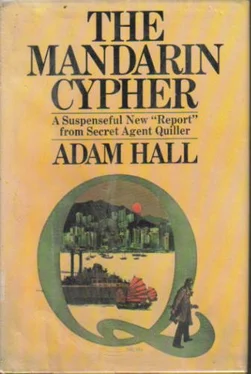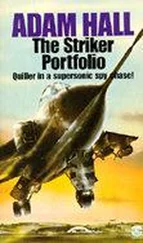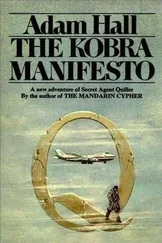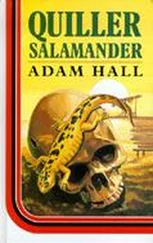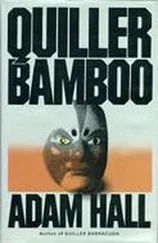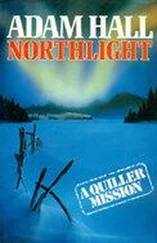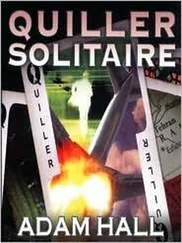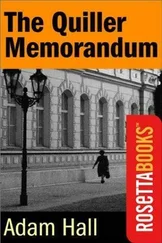The Chinese near the door pulled it open and beckoned us outside. He looked like the one who'd escorted Tewson to the Golden Sands Hotel. He went out first and we followed and nobody said anything till we were going along the deck towards the living quarters and suddenly I knew I had to make a move and I didn't know precisely what kind of move and I had to think and I thought fast, strolling beside Tewson near the rails.
It didn't have to be a physical move. The last-ditch get-out thing I'd set up wasn't for now: it was for the dark and for the time when I was driven to do something suicidal. The move I had to make now was psychological and I was beginning to see its shape.
Situation: I was free to walk on deck in the warm afternoon sunshine and chat with my fellow countryman but appearances were deceptive because this was an opposition stronghold and they'd got me and they were going to keep me unless I could stop them and I didn't think I could stop them. In metaphysical terms I was at the wide end of a narrowing tunnel that would take me through the imminent interrogation phase with their professional from the Hong Kong cell and through increasingly restrictive incarceration and withholding of privileges to the final elaborate mind-bending sessions with the intelligence psychiatrists in Pekin that would leave me physically emaciated and with irreversible personality changes that would kill off any hope of making an eventual break because I would no longer be the kind of human being who could plan such a thing or even want it .
Probably it was my last chance of using Tewson for my own purposes or even of seeing him again. They'd briefed him to question me before they put any kind of pressure on because you couldn't feel suspicious of a chap born under the same flag and all that, and I was expected to be relaxed and make a slip or decide to give him my confidence. I'd pushed this one as far as I could and the only thing that worried me was that he'd seemed to accept the fact that I'd met him sometimes at the golf club. The dossier on George Henry Tewson that Macklin had given me was exhaustive, even to the names of his acquaintances in Redhill, but I'd expected him to challenge me on this one: what year were you there, then? I don't seem to remember you , so forth. But in the first few minutes of talking to him I'd recognized a whopping case of homesickness and thrown him the golf club thing: and I think he took it without question because he'd wanted to run into someone from his intimate past, all the way out here on this remote prison of his where he lived among strangers.
I think he'd accepted the whole of my cover story and the two Chinese had been listening attentively so that they could trip me on the second time round. They wouldn't be able to do that because I'd been speaking to their ears and not Tewson's and there wasn't anything they could trip me on, so they'd have to console themselves with the obvious ones: what were you doing so far from land in a small rubber dinghy, why were you sworn to secrecy, who is your friend , so forth. That was all right. Most of the cover was pick-proof: the thing about cutting the anchor free and then losing consciousness was to give me a base they'd never find but couldn't prove was non-existent. Because they were going to check up on every word: I'd heard the helicopter take off soon after they'd brought me aboard and I was pretty certain they'd gone to pick up the interrogator in Hong Kong. So I didn't have long to make a move.
I made it.
The Chinese was leading the way and the guard had followed us out of the clinic and I don't think I could have said anything to Tewson quietly enough without their catching some of it and even if they only caught a couple of words they'd get the drift. But the riveter had started up a few minutes before we'd left the clinic and it was still hammering away on one of the lower decks, and the sound cover was adequate.
It was a hundred to one against my getting off this missile base with a whole skin but I was going to try and if I got clear then I was taking Tewson.
Tewson was the target for Mandarin.
He was the objective London wanted me to bring out: Executive will withdraw objective from target zone . And if I was going to pull off a hundred-to-one shot and get out alive, then I was going to take the objective with me because I wasn't interested in aborting the mission.
I didn't have much to lose.
Because you don't need a capsule, you know, when it comes to the crunch. That's just the most convenient way. You don't even need drain cleaner or exhaust gas or a knife or a gun or a high window without bars or a rope: you just need your nails and an artery — and their belief that you want to stay alive . That bit's important because if they think you're going to try switching off they'll start watching you and that's a bore.
I'd do it because I don't like tunnels: I'm claustrophobic.
I wouldn't want to go through with the intensive interrogation phase and the increasingly restrictive incarceration and the final mind-bending sessions in Pekin because they'd break down the psyche to the point when I didn't think the Bureau was important any more and then I'd give them the lot. And I wouldn't mind .
But I minded now.
So I hadn't got much to lose if I tried to get the objective out of the target zone and failed, even if it killed me. A lot would depend on Tewson.
He was saying something but I couldn't hear.
'What?'
'Bloody noise!' he said with his quick white laugh. 'They're doing repairs!'
'Just like the Strand,' I said, 'always got the road up!'
We laughed about this, nodding together.
The Chinese in front of us hadn't turned round so the chance was wide open and I went over the whole thing in the next two seconds to make sure I got it right.
I had to blow my cover.
But only to Tewson: not to the opposition. They'd told him, or they would later tell him, that I was an intelligence agent sent to Hong Kong to find him and take him back to London; and I'd have to say something to him that would cut right across their story. It must be something he couldn't repeat to the opposition without endangering himself . And it must carry the name of a sponsor to give it high credibility, but a sponsor he couldn't contact openly for confirmation. And finally it must be short, because at any next second the din of the riveter could stop and leave me without aural cover.
All I had to do was light a fuse. A short-burn fuse in his mind.
'Tewson.' I waited till he'd turned his head, then pitched my voice against the background noise. 'Nora says she's found out you're expendable. They're going to kill you the minute you've done this job, for their own security. She wants me to tell you to get out of this as soon as you can.'
'When?'
'Last night.'
'What time?'
'I've told you I can't remember what the time was!'
'You told me nothing!'
'Oh for Christ sake 'Who are your employers?'
'I'm not going to tell you!'
'Because you are lying!'
'If you say that again I'll — '
'Where are they now?'
'Who?'
'Your employers.'
'They're — oh Jesus, are you off your fucking rocker? How many times have you asked me that one?'
He'd been at me for two hours without a break but he wasn't very good. Thin chap with a wide jaw and a short haircut, Mao tunic, some kind of insignia, worker's merit medal or something. He'd started sweating because of the heat of the lamp.
They'd given me the smallest cabin on the whole rig: one narrow bunk set in the wall like a niche at the crematorium where you put the urn, cheap cardtable and picnic chair, army mirror on a chain, tin-washbasin, no loo. There was only one lamp and it was high on the wall and they'd put a two hundred watt bulb in it and he was getting as much of the glare as I was, but I suppose he thought he should do this thing like they did it on the flicks.
Читать дальше
